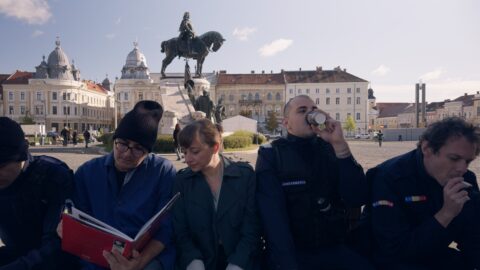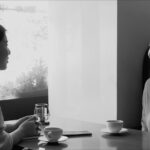Radu Jude films are perfectly suited for film festivals because they mirror the kinds of conversations that people have at film festivals. Aided by a lack of sleep, too many (caffeinated and alcoholic) beverages and the constant whiff of cigarette smoke, opinionated journalists — whose job it is to just say things for a living — can often meander from topic to topic, offering hot take after hot take on anything and everything to anyone who will listen. We wouldn’t be in this business otherwise.
And the best thing about a Radu Jude film is how it can often feel like you’re right there in the room with him during one of those terrific festival conversations, listening to his variously knotty opinions about racism, discrimination, late-stage capitalism, corruption, cronyism, morality, theology, zen buddhism and (wo)man’s search for meaning in a world that is falling apart. But Jude, although often didactic, is not a blowhard; there is a great generosity and humour in his work that brings you along with him, letting you bring your own opinions to the way we live now.
I mention discourse and festivals because Jude’s films feel refreshingly contemporaneous. While many filmmakers offer takes on the past or visions of the future, Jude brings us dispatches from right now. This moment. As Germany goes to the elections; as the USA plans to sell Ukraine down the river; as JD Vance gives Europe a lecture on democracy; as we all live and breathe in a late capitalist economy designed to extract so much and give so little in return. It makes his work a little thrilling, a little scary and deeply stimulating, like the best kind of conversations.
Set in Cluj Napoca, Transvlyania, Romania, a tech hub, great city of cinema, and altogether charming place, Kontinental ’25 (2025) — the title and plot is a riff on Roberto Rossellini’s Europa ’51 (1952) — appears to start as a work of Italian-inspired neorealism, following a homeless man (Gabriel Spahiu) as he looks for bottles to recycle in the park. But, in the first sign of Jude’s eye for ridiculous details, it turns out he’s in a bizarro dinosaur park, replete with plenty of animatronic, prehistoric beasts. It’s still the real world, but isn’t the real world actually rather odd?
He is eventually forced out of his temporary accommodation at the bottom of a building by baliff Orsolya (Eszter Tompa), who is ethnically Hungarian. This is a last resort on her part, and is taken with much care and precaution, but it still leads to tragic consequences. But while Rossellin’s Ingrid Bergman is forced to become a do-gooder in the face of a terrible event, Jude decides, well, to be Radu Jude, taking us on a strange and loopy journey through the infinite permutations of guilt and the seeming impossibility of making a difference in a world ruled by the dark and invisible hand of international capital and institutional rot.
It joins I Do Not Care If We Go Down in History as Barbarians (2018), Bad Luck Banging or Loony Porn (2021) and Do Not Expect Too Much From The End of the World (2023) as another female-led story about the bitterly cruel, ironic and unfixable society we live in. Tompa, mixing between Romanian, Hungarian, and at one crucial point, German, holds our attention with ease, able to give us a fully-rounded and nuanced depiction of a woman caught up in a career she disagrees with in order to live in a world where nothing makes sense anymore.
The resultant film is basically structured as a series of conversations with friends and family, covering everything from Romanian nationalism to Hungarian nationalism, to the horrors of Gaza to the horrors of Ukraine, to the absymal treatment of Roma gypsies, to questions of why God allows suffering to questions of inherent corruption in the construction trade, each chat giving us another side of the increasingly nuanced (and even more increasingly confused) Orsolya. It helps that Jude has a great ear for dialogue, diverse pop culture references (Wim Wenders, Brecht, Star Wars appear) and self-effacing Romania jokes, making the final product as diverting as it is thought-provoking. I could easily watch a three-hour cut.
While each of his last major fiction films (he is also a prolific documentarian) felt like it brought a new formal innovation with it, Kontinental ’25 is relatively straightforward. The visual language is more restrained, the acting less flamboyant and the essayistic impulses whittled down to a simple (yet effective) montage of new-build apartments. In fact, shot on an iPhone and often failing to focus correctly, it has a little amateurish charm. Additionally, for all the racist slurs (against Russians, Gypsies, Jews, Romanians and Hungarians), inappropriate social media footage and sexual content contained herein, there is nothing here quite as shocking as Bad Luck Banging, as provocative as Do Not Expect Too Much or as necessary as Barbarians.
Still, Jude, working firmly in a loose, stimulating mode that can only be described as Godard-in-the-Balkans, provides a cinematic experience that can only be described as his own — a conversation from a colleague, a deep sigh about the state-of-the-world, an absurdist joke in the face of a completely screwed situation. With devastating wars, the return of fascists across the so-called democratic West and shady companies pulling the strings of everyone’s personal lives, Jude’s state-of-the-continent address rings with haunting relevance.
Redmond is the editor-in-chief of Journey Into Cinema.





